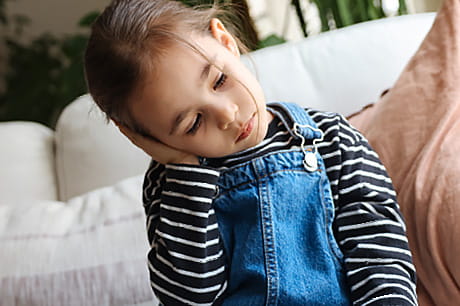Infection
Signs of ear infections in infants and kids
Caring for a little one often requires some detective work. Are they fussing because they’re hungry? Wet diaper? Sleepy? If none of these seem to be the case, it could be an ear infection.
“Childhood ear infections are extremely common,” explains Aileen Wertz, MD, a pediatric ear, nose and throat (ENT) specialist at Geisinger. “The National Institutes of Health estimates more than 80% of kids will have had at least one by their third birthday.”
Here’s how to tell if your little one has an ear infection — and how to help prevent them in the first place.
Signs of ear infections in children
Since babies are too young to tell you when they’re in pain, it’s smart to learn the nonverbal signs that tell you when something’s wrong.
Symptoms of ear infections in infants include:
- Crying more than usual
- Tugging or pulling at ears
- Trouble sleeping
- Fever of 101°F or higher
- Diarrhea, vomiting or not wanting to eat
- Fluid draining from ear
- Loss of balance
- Less response to sounds or hearing concerns
Ear infection symptoms in toddlers and older children are the same, with the addition of complaining about an earache.
If you notice any of these signs, it’s a good idea to call your child’s pediatrician or primary care provider — especially if you see fluid draining from their ear.
“The drainage we look for with ear infections is very different from ear wax,” Dr. Wertz explains. “It’s a clearer liquid, more like what you see with nasal discharge.”
Regardless of other symptoms, if your child has a fever, it’s always best to call their doctor right away. “Talk to your pediatrician if you notice a 100°F temperature or higher for newborns and 101°F or higher for children 1 year and older,” advises Dr. Wertz.
Is it an ear infection or teething?
Because teething can also cause irritability and discomfort in infants, it can be hard to tell the two apart. But according to Dr. Wertz, there are signs to look for.
“When young children are teething, there’s pain and fussiness and sometimes a low-grade fever,” she explains. “But a fever of 101°F or higher is a pretty good sign that you’re dealing with an ear infection, especially if they’re pulling at their ears, too.”
Treating ear infections in infants and kids
The good news: Most childhood ear infections are not serious, and many clear up within a few days on their own. “But if your child’s symptoms haven’t improved after three days or they have a fever, it’s time to call your doctor,” says Dr. Wertz.
The best treatment depends on a few factors, including whether the infection is bacterial or viral, as well as where it’s located.
“If the infection is in the ear canal, your child will probably be prescribed ear drops,” explains Dr. Wertz. “These external ear infections are often caused by water in the ear from swimming.”
On the other hand, infections in the middle ear (behind the eardrum) usually occur with colds or seasonal allergies. “They’re a bit more serious, and it usually takes oral antibiotics to clear them up,” says Dr. Wertz. “And acetaminophen or ibuprofen can help with the pain.”
Talk to your child’s doctor before giving any over-the-counter pain medicine — ibuprofen shouldn’t be given to babies under 6 months old and children shouldn’t take aspirin.
How to prevent ear infections
While there’s no surefire way to prevent ear infections in your infant or child, there are steps you can take to reduce their risk of developing one. Here are a few tips for keeping your child’s ears healthy:
- Wash your hands often and teach young children to do the same to prevent spreading germs.
- Don’t expose your child to cigarette smoke, air pollutants or allergens. These can irritate the ear canal and increase the risk of infection.
- Consider breastfeeding, if possible. Studies have shown breastfed babies are at a lower risk for ear infections.
- Don’t feed your baby while they’re lying down. An upright position helps keep fluid from pooling in their ears.
- Make sure your child eats a healthy diet full of fruits and vegetables. A balanced diet maintains a healthier immune system.
- Don’t put cotton swabs or other objects in your child’s ears. They can push wax deeper and damage the sensitive parts of the ear.
- Avoid pacifiers and discourage thumb sucking — both have been linked to more frequent ear infections.
- Keep your child’s ears dry. After swimming or bathing, gently dry your child’s ear with a soft cloth.
- Make sure your child is up to date with their vaccinations. They can help protect them from bacteria and viruses that could lead to ear infections.
What to do about chronic ear infections
If your child has repeated ear infections, you may be referred to a pediatric ENT specialist like Dr. Wertz — also known as an otolaryngologist.
“The most common treatment for chronic childhood ear infections is to place a tube in the eardrum to provide ventilation to the middle ear and prevent fluid buildup,” says Dr. Wertz. “This very minor outpatient procedure usually resolves the issue right away.”
Dr. Wertz adds that most ear tubes fall out on their own.
“If your child has frequent severe ear infections, they need to see their pediatrician or primary care provider — who can refer them to an ENT specialist, if necessary,” says Dr. Wertz. “Left untreated, infections can affect your child’s hearing and speech development. So it’s definitely worth having them checked out.”
Next steps:
Learn more about pediatric ENT care at Geisinger
How to tell if your child has RSV
What to do when your child has a fever

